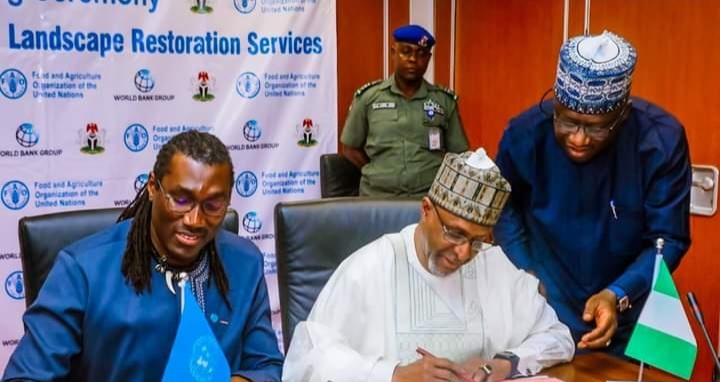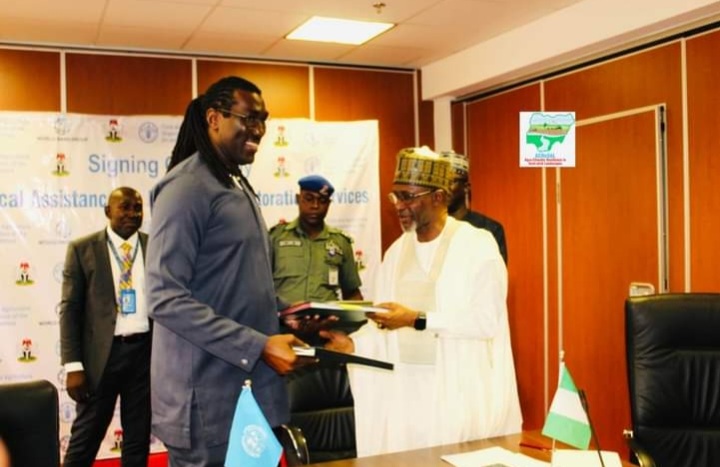Environment Ministry, FAO to recover 350,000 hectares of degraded landscapes under ACReSAL Project

In furtherance to the ACReSAL Project efforts to recover one million hectares of degraded lands, increase the adoption of sustainable landscapes management practices, enhance community livelihood, improve access to market and value chain development, create jobs, increase food production and security, build capacity, strengthen community resilience to the challenges of climate change and others, the Minister of Environment, Balarabe Lawal, has signed a contract of partnership with the Food and Agricultural Organization of the United Nation (FAO) to recover 350,000 hectares of degraded landscapes for environmental sustainability under the ACReSAL Project.
Speaking during the signing and exchange of documents, at the United Nation building in Abuja, the minister said that the 350,000 hectares of land would be recovered in 19 Agro-Climatic Resilience in semi-Arid Landscape (ACReSAL) states and the FCT.
“We gather to sign the contract for the engagement of the Technical Assistance of the United Nations Food and Agricultural Organization to restore 350,000 hectares under the component B of the Project Development Objective of the ACReSAL Project towards building community climate resilience which reflects a shared commitment to a sustainable practice and a determination to make a positive impact on our environment.
“The importance of landscape restoration efforts cannot be over emphasized especially in the context of our environmental health and its visible impact on the livelihoods of the communities in the entire northern part of Nigeria.
”Northern Nigeria, with its rich biodiversity and cultural heritage is plagued with serious challenges that requires innovative and collaborative solutions, it is indeed a great achievement to witness the commitment of the FAO and our partners, the World Bank to address these challenges by building capacity of the community to adapt and mitigate the challenges through this ground breaking initiative.

“We are all aware that this contract signing represents a legal agreement and it symbolizes a shared vision for a sustainable, a more resilient future, I am persuaded that this engagement for the technical assistance to restore large scale landscape will yield evidenced outcomes towards healthy environment, ensuring food security, and well-being of the communities, as we embark on this journey of landscape restoration, we are taking a collective decision towards a future where the ecosystem will thrive and communities will flourish,” he said.
“As we celebrate this milestone today, let us be mindful of the responsibility that comes with it; the success of this engagement will depend on our collective efforts, perseverance and ability to adapt to evolving circumstances.
“Therefore, let us foster a spirit of collaboration, innovation and inclusivity as we work towards a common goal of restored and resilient landscapes in the 19 ACReSAL States and the FCT,” the minister said.
The minister commended the National Project Coordinator, Abdulhamid Umar and his team at the Federal Project Management Unit for their commitment to seeing this contract come through, to the lender, the World Bank for their continued support and guidance.
He congratulated both the Steering and Technical Committee members of the Ministries of Environment, Agriculture & Food Security and Water Resources & Sanitation and prayed that the contract signing would be the beginning of a transformative journey towards achieving the target set for broader landscape restoration in Nigeria.
Earlier, Dominique Koffy Kouacou, FAO Representative ad interim in Nigeria and ECOWAS, said that FAO was committed to sustaining the support to the government and the ministry in particular to protect the environment and sustainably conserve Nigeria’s vast natural resources.
“The objective of ACReSAL is to increase the implementation of sustainable landscape management practices in targeted watersheds in northern Nigeria and strengthen Nigeria’s long-term enabling environment for integrated climate resilient landscape management.
“The agreement we are signing today is important to FAO because the objective is to provide the required technical expertise for the development and implementation/up-scaling of the landscape restoration subcomponent of the ACReSAL Project in synergy with the Great Green Wall Sahel-wide initiative of the African Union.
“This technical assistance will certainly improve the development and delivery of resilience for land restoration and Climate Smart Agriculture knowledge and services to both the federal, state and community levels by designing training materials and curricula tailor-made for restoration and value chain development,” he said.
The FAO representative added that the technical assistance would equally complement the activities supported by the Great Green Wall Sahel-wide initiative of the African Union.
He noted the ACReSAL Project Development Objective (PDO) aligns with one of the FAO global aspirations which is a better environment.
In her remarks, Dr. Joy I. Agene, the Task Team Leader of the ACReSAL Project and Senior Environmental Specialist-World Bank Nigeria Office said today is a very big day for ACReSAL, this has been a very intense process, however, it is a demonstration of resilience and commitment towards supporting the country to address the impact of climate change.
She congratulated and thanked everyone for having contributed to the success of the partnership.
She highlighted that one of the mandates of the ACReSAL is to reclaim 1 million hectares of degraded land in Nigeria and this partnership is expected to support ACRESAL to reclaim over 350 thousand hectares out of the 1 million hectares.
She said that the ACReSAL would collaborate with stakeholders to come out with an efficient outcome on the implementation of the project.
Mr Abdulhamid Umar, National Project Coordinator, ACReSAL, said that the collaboration would ease the burden of farmers in the Sahel Regions because FAO as part of its Action against Desertification programme has developed a technology to restore degraded lands; deployment of the delphino plough and tractor to achieve large scale landscape restoration.
He said that the project would equally address carbon emissions, greenhouse gas, unemployment challenges and poverty.
Umar said that the ACReSAL project was anchored on four pillars namely– the dry land management, community climate resilience, institutional policy strengthening and project management, and contingent emergency response.
He noted that the Federal Ministry of Environment is the lead implementing Ministry in collaboration with the Federal Ministry of Agriculture and Food Security and Federal Ministry of Water Resources and Sanitation.
